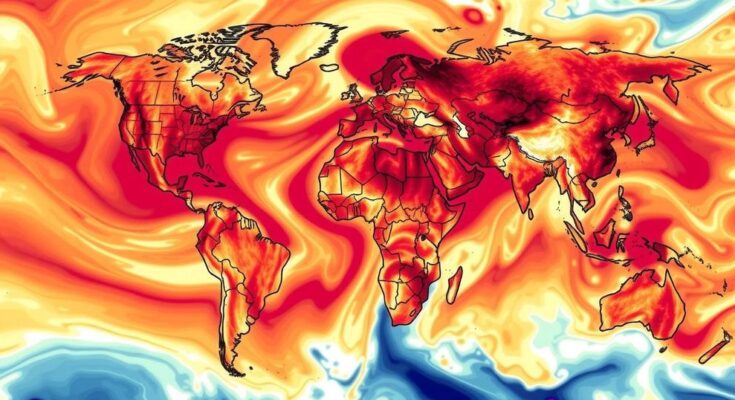Scientists from the European Union confirm that 2024 is the hottest year on record, with high global temperatures expected to persist into early 2025. Extreme weather events linked to climate change have surged this year, prompting calls for immediate and effective action against rising emissions. La Nina may provide slight temporary cooling in 2025, but significant climate risks remain.
In a significant announcement, European Union scientists have confirmed that 2024 will become the hottest year recorded in history, with expectations of continued high temperatures extending well into early 2025. The insights provided by the Copernicus Climate Change Service reflect alarming trends in climate change, reinforced by the recent $300 billion action plan from U.N. climate talks aimed at addressing the impacts of climate-related disasters, deemed insufficient by some developing nations. Meanwhile, severe weather events marked 2024, exacerbated by human-induced changes in climate, underscore the urgent need for comprehensive emission cuts to mitigate future risks.
This year, the global average temperature surpassed the critical threshold of 1.5 degrees Celsius (2.7 degrees Fahrenheit) above pre-industrial levels. The previous record holder was 2023, and extreme weather phenomena, such as droughts, floods, heatwaves, and cyclones, were widespread, claiming lives and impacting economies worldwide. Such events, particularly fatal incidents during the year, reflect an alarming pattern directly linked to man-made climate change. Copernicus climate researcher Julien Nicolas indicated, “We’re still in near-record-high territory for global temperatures, and that’s likely to stay at least for the next few months.”
The warming climate has prompted scientists to analyze potential impacts of the La Nina weather phenomenon, which may temporarily moderate temperature levels in 2025 but would not suppress the long-term upward trend caused by greenhouse gas emissions. As nations strive for net-zero emissions, global carbon dioxide levels continue to rise. Dr. Friederike Otto from Imperial College London emphasized caution, noting, “While 2025 might be slightly cooler than 2024, if a La Nina event develops, this does not mean temperatures will be ‘safe’ or ‘normal.'” The implications of climate change remain dire, with continued risks of extreme temperatures, droughts, and severe weather disasters expected.
This situation exemplifies the urgent need for all nations to fulfill climate commitments and substantially reduce emissions to protect future generations from potentially catastrophic climate outcomes.
The context of this announcement stems from a broad array of scientific research and data collection initiated by the Copernicus Climate Change Service (C3S), which has been tracking global temperatures since 1940 and cross-referencing historical climate data since 1850. The relevance of this year’s record-breaking temperatures coincides with global discussions on climate change, particularly following a major U.N. climate conference that focused on financial commitments to combat climate-related emergencies affecting poorer nations. This background is crucial for understanding the human-induced factors contributing to extreme weather patterns recognized worldwide in 2024.
In summary, 2024 is projected to be the hottest year on record, significantly influenced by human activities contributing to climate change. The unfolding severe weather events highlight an urgent necessity for global cooperation aimed at emission reductions. Although a temporary cooling event through La Nina may occur in 2025, it will not alleviate the long-term impacts of ongoing climate change. Stakeholders must prioritize effective measures to combat rising global temperatures to avert future disasters.
Original Source: www.onmanorama.com




